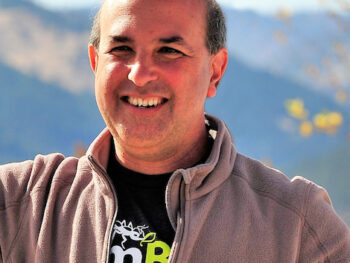Teachable Moments Series

Ecology is a scientific discipline. Its practitioners make observations, generate plausible explanations (i.e. hypotheses) for what they note, and evaluate these hypotheses with data. In other words, ecology is not advocacy. Many ecologists grow apprehensive when asked to weigh in on political topics. Unfortunately, one of the topics that ecologists frequently address as scientists regularly thrusts them into the partisan culture wars. Namely, climate change.
Climate scientists overwhelmingly agree that the science surrounding climate change is clear: Earth’s climate is warming and this warming is a direct result of the greenhouse gasses that have been injected into the atmosphere, primarily as a result of fossil fuel combustion. Nevertheless, the presumptive presidential nominee of one of the country’s two major parties is openly hostile to climate science. Given this, how can we, as educators, broach the topic without appearing to be pushing a political agenda? It’s a thorny question with no simple answer.
I was reminded of this fact when Florida Governor DeSantis signed a law deleting climate change from state policy. This is the sort of misguided policy that screams out for a response. Unfortunately, responding to DeSantis head on in a classroom is likely to alienate the students who believe efforts to combat climate change really are misguided. Worse, ignoring it means that some students are left with the impression that climate change is merely a matter of opinion and that the science behind it is suspect.
Educators and climate scientists offer a wealth of good advice on how to broach this topic, including this wonderful recent interview with Dr. Ayana Elizabeth Johnson. I’ve written about some of these excellent recommendations here and again here. One of the common themes found in these recommendations is that people often relate to examples that drive home the real-world, personal impacts of climate change. And perhaps nothing is more “personal” than insurance. Along with death and taxes, insurance premiums are a fact of life and when they go up, people notice.
Over the past decade, economic losses from wildfire, hurricanes, tornadoes, and floods have increased dramatically. According to one analysis, the number of states where insurers are paying more in claims than they take in in premiums has more than doubled over this time span, with 18 states listed as unprofitable in 2023. These losses led Bill Montgomery, chief executive of Celina Insurance Group to proclaim: “Climate change is real. We can’t raise rates fast enough or high enough.” Worse, the insurance industry isn’t simply raising rates; it has stopped offering homeowners insurance to people living in places where the risk has gotten too great. Somewhat ironically, no place has been hit harder by this trend than Florida, where insurance companies are not simply pulling out; they are going out of business. In many places across the country, insurance against natural disasters has become so expensive that homeowners are risking going without.
This suggests that talking about the increased costs associated with climate change (and how these wind their way into the insurance market in the form of increased risks) could offer an opening for a productive dialogue. By asking students how they would address the increased insurance costs associated with elevated risk (a wonderfully mathematical concept), we can help make them feel invested in both the problem and its solution, which is an excellent place to start.






 The hidden benefits of Ecology courses
The hidden benefits of Ecology courses
